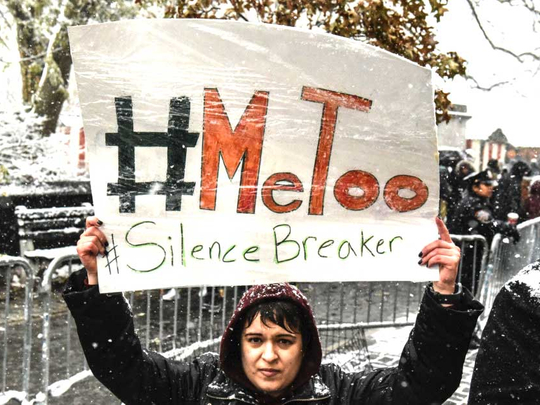
In a north London studio last month, I met the activist and charity worker Bex Bailey for the first time. She had been among the first women to publicly come forward to add Westminster to the #MeToo movement, sharing her harrowing story of how she had been raped at a Labour Party event in 2011 and had been told to keep quiet by a senior official. Along with Harvey Weinstein’s former assistant Zelda Perkins and the German Green MEP Terry Reintke, we were, amid utmost secrecy, being photographed for Time magazine’s Person of the Year coverage.
While it was clear we were on the shortlist, we did not know that the women — and some men — involved in the #MeToo movement were being named winners, as the “Silence Breakers”, until just after midday on December 6, when it was revealed to the world. Over the past two months, as allegations about Harvey Weinstein and other rich and powerful men spilt out of Hollywood, New York and Washington, it was clear that momentum was building behind the movement to call out cases of sexual harassment and assault. When it reached the UK in late October, it hit Westminster straightaway — unsurprisingly, given the way power is hard currency. Yet, even when I played my own small role in this story, by reporting Sir Michael Fallon to Downing Street for lunging at me after a lunch when I was a 29-year-old reporter, triggering his resignation as defence secretary hours later, I did not fully appreciate what a game-changing moment #MeToo was.
Indeed, Time’s recognition of the “Silence Breakers” as shaping the news of 2017 matters because, in those early days, it was easy to feel like things would never change. When those of us in the UK, particularly in Westminster, spoke out, there was a backlash from some quarters. When Bex came forward, some asked why she hadn’t gone to the police (not appreciating that this is a tough thing for a rape victim to do). I was asked why I hadn’t spoken out sooner — when in fact my decision to come forward was motivated by hearing of more recent allegations involving the defence secretary, made by women who didn’t want to go public. When Kate Maltby, the theatre critic and journalist, told of how she had been harassed by Damian Green, Theresa May’s deputy — which he denies — she found herself put through three levels of scrutiny: first, by taking the courageous decision to speak out; next by being subjected to what amounted to a character assassination by a national newspaper; and finally by a Cabinet Office inquiry by Sue Gray into the claims, which has been ongoing for a month. While she has had to maintain a dignified silence since giving evidence to the inquiry, the First Secretary of State’s friends have accused her of lying and have questioned her motives. Of course, it’s only right that, when allegations are disputed, there be a thorough and fair investigation. But attempts to publicly discredit Kate, which come on top of the already strenuous inquiry process, send a terrible message. From private conversations I have had with other women over the past few weeks, this overall effect has forced some who were on the verge of speaking out to retreat back into the shadows for fear of reprisals. Yet despite this backlash from some, there has been huge support from others, both men and women and of all ages and levels of seniority in the media and politics. This sense of solidarity must continue, because while we have had support, it is now our duty to help other women in all parts of society who cannot speak out, who do not have the same media profile or followings on Twitter.
For Time to recognise this moment as its most important of 2017 is something to celebrate, because it does feel as if, despite the backlash, a difference will finally be made. I am proud that, along with Bex and Zelda, we are the first Britons to be recognised by Time as Persons of the Year since the Queen in 1952. Yet what is clearly a moment of 2017 must not become trapped in the zeitgeist of this year. What was a trending topic on Twitter must turn into lasting cultural change in society. Men who are used to acting inappropriately with impunity need to understand that this behaviour will no longer be tolerated. And having become the silence breakers ourselves, it is the duty of all of us on Time’s list to break the silence for others.
— The Telegraph Group Limited, London, 2017
Jane Merrick is a British political journalist and former political editor of the Independent on Sunday newspaper.










